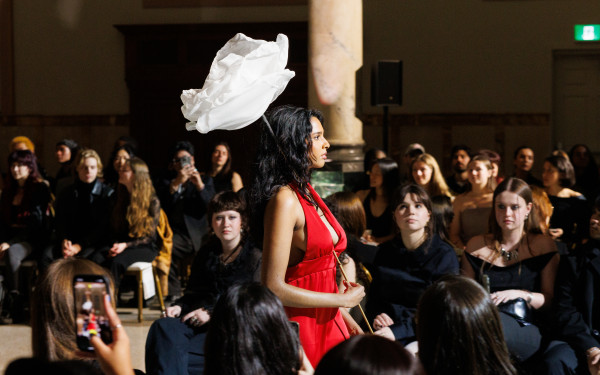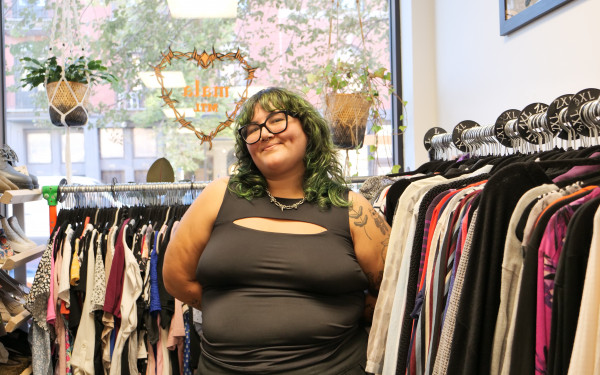Designs from discards
MODE Collective is bringing sustainable fashion to campus
In a small, cosy space tucked within Concordia University’s Grey Nuns Residence, old T-shirts, thrifted bed sheets and forgotten fabrics find new life.
Here, members of Concordia’s MODE Collective are reshaping how fashion looks and feels on campus.
Part sustainability initiative, part creative hub, MODE offers students a hands-on experience with upcycling, connecting with like-minded people and redefining their style. Co-founders Sara Khider and Ethan Muirhead started MODE in 2023 after an unsuccessful search for a fashion-focused club on campus. The club aims to promote sustainability and ethical consumption by encouraging self-expression through environmentally friendly and economically sustainable fashion.
“[It’s about] taking something old and making it new, making it different, making it better, continuing the lifespan of something,” said Lucy Alexander, the club’s booking officer.
The collective hosts upcycling workshops at Concordia University Centre for Creative Reuse (CUCCR) in Grey Nuns to promote their sustainability goals. Beginners are taught how to use different tools and are guided through the upcycling process, while non-beginners can use the space, tools and materials for their own projects, sharing personal tips and tricks with others.
MODE’s workshops typically draw five to 10 attendees.
“What’s great is that it’s a very small space, so we’re really able to have one-on-one experiences with the people who come,” Khider said.
CUCCR is donation-based, providing Concordia students access to donated clothes, fabrics and raw materials, as well as crafting tools like sewing machines, button makers and book binding machines. This partnership has provided MODE with the tools and materials needed for upcycling, eliminating all costs and resources members would have had to contribute otherwise.

“They provide a lot. I've seen brooms, I’ve seen lamps, I’ve seen cups,” Khider said. “[It’s] kind of like a thrift store.”
In the wake of Concordia’s tuition hikes, CUCCR’s future is uncertain. The university has yet to renew the centre’s funding for 2025, which could affect MODE’s operations.
“The club will still be functioning,” Khider said. “We’ll still be able to do events for sure.”
Khider and the team are considering alternatives, like clothing swaps and donation events, if CUCCR closes, as building a sense of community is central to MODE’s mission.
“The community aspect is really important to us because I started this club to make friends in the beginning,” Khider said. “We really wanna just meet people.”
Alexander said she also shares the sentiment, initially joining to meet others and have fun.
MODE has a series of events lined up, including a “Stitch and Sip” event with the Fine Arts Student Alliance at Reggies Bar on Wednesday, Nov. 27. At Stitch and Sip, students can bring their own crochet and knitting projects, or use provided kits to get started on small projects and learn the ins and outs of crochet. The event is designed as a stress reliever during the busy exam season, where participants can grab a drink and chat with others.
“Our club is very community-based. We just want to have this space for people to talk about fashion in any way, shape or form, and be able to express themselves,” Khider said. “I hope that our impact is really [...] to sensibilize people to how easy it is to just make stuff on your own.”
MODE’s first workshop on Feb. 5, 2023, helped participants learn to sew by making a tote bag. One participant upcycled an old T-shirt to make their tote. Upcycling with unexpected material is a common theme in sustainable fashion. Members have upcycled pants into skirts, while others have thrifted old bed sheets and blankets to use as fabric.
Alexander recognizes working with upcycled materials can be challenging, as finding the exact materials for the design someone envisions can be difficult. However, she noted it often leads to unique and creative results: a stylish accident.
“In terms of the society we live in, where everything is constantly pushed at us, and consumerism, it's nice to kind of wipe that back and make your own stuff that you care about, and not be caught in that cycle,” said Maria Saldana, MODE’s social media coordinator.
For Alexander, asking yourself specific questions can help change the way you consume.

“What are you doing with that shirt that you never wear?” Alexander asked. “Are you donating it? Throwing it out?”
The collective’s sustainability goals go beyond fashion. For events hosted outside of Concordia, MODE considers their ecological footprint. In February, MODE threw a launch party at Bar La Shop, accompanied by DJ sets and drag performances. In preparation, members planned in terms of waste, considering factors like printing posters or how to dispose of used beer cans in an environmentally conscious way.
MODE hopes to continue promoting fibre arts in their future initiatives. Plans are underway for a free-roam exhibition with a runway at the end of the year. This event will be open to members and fine arts students, providing a platform for showcasing wearable and static fibre artworks.
“I know that fibre arts students have a lot more static pieces that are not meant to be worn, [and] some have pieces that are meant to be worn,” Khider said. “It would be more like an interdisciplinary space where we would have all those different fabrics showcased.”
At its core, MODE is a space for anyone and everyone, whether active in the sustainable fashion community or simply interested in learning more about fashion sustainability.
“Do your own thing and try to find your own spaces in the community,” Saldana said.
This article originally appeared in Volume 45, Issue 5, published November 5, 2024.







_1_600_375_90_s_c1.jpg)